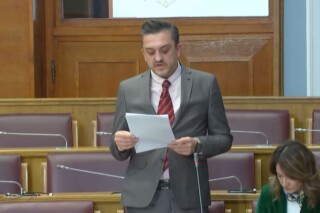Law on Freedom of Religion represented an initial cap for the conflict that has become pretty intense, the SOC-Montenegro conflict. The Law has been a motive but over the course of time, it has turned out that SOC is an instrument in the hands of the Great Serbian nationalism, said Montenegro’s president, Mr Milo Đukanović, in an interview for Croatian radio and TV.

What’s your opinion about current relations between Croatia and Montenegro? How important was official visit of Mr Milanović in that context?
Mr Đukanović: I think our relations are friendly, a very great example of stable neighborhood in our region. Over the past 20 years, our relations have improved. Today we can say that there’s no any area where or relations aren’t developed. Several days ago, Minister of Foreign Affairs of Croatia visited Montenegro too, as well as several other Croatian representatives. We see that as gesture of friendship with Montenegro and also as commitment to our EU perspective.
What do you think about Croatia’s role in approaching South East of Europe to European integration?
Mr Đukanović: I will reiterate that Croatia’s experience is a valuable example of success in approaching countries of the South East Europe to European objectives. Neighbors’ experience is very welcome. Montenegro relies on experience of Croatia very much.
Croatia’s presidency over the EU Council was priceless for us, as it made many recommendations for the WB. That’s very important for both WB and the EU. Stability and European perspective of WB are the same. We believe in Croatia’s commitment in that mission.
Seems like accession negotiations with the EU are stagnant right now. Montenegro is required more progress in the area of rule of law and judiciary?
Mr Đukanović: I believe it is necessary to first notice that reform enthusiasm in the region has dampened over the past few years, and in my opinion, it is the consequence of a stagnation in the enlargement policy conducted by the previous EC.
New Commission has said that it wants to be geo-political subject, which is seen as very positive statement when it comes to the future of WB as WB has become region where interests of major geo-political players collide. Our interest is that the EU has the dominant role. In addition, new EC has sent several messages that enlargement policy is still alive and that it wants to provide incentives.
As far as rule of law is concerned, EU’ expectation is in place. We are not going to reveal a secret by saying that societies of WB are in deficit of rule of law.
I would like to emphasize that a considerable progress has been made in that area. Of course, that’s far from what we want, as we strive for Europeanization of Montenegro. We want to be part of modern European culture and civilization.
Twenty years ago you apologized to Croatian people for Montenegro’s assistance in the aggression of the region of Dubrovnik. Would you add something to that apology now?
Mr Đukanović: I don’t think I should add or change anything I said twenty years ago. If I could, I would change what had happened before. In that frequent repetition of instability, we also had the 1990s experience, which resulted in the decay of our former joint state and bloody wars. In the capacity of Montenegro’s president, I saw fit to apologize to Croatia.
I am glad that that gesture of mine, definitely the first in our region, was praised by the most relevant state addresses in Croatia and that it marked the beginning of a new historic page in our relations. Therefore, I think there’s nothing that should be changed in our twenty-year long experience.
We have been witnessing tensions coming from SOC provoked by the Law on Freedom of Religion. What do you think about that in regional context?
Mr Đukanović: As you have said, Law on Freedom of Religion represented an initial cap for the conflict that has become pretty intense, the SOC-Montenegro conflict. Our intention was to adopt law which will replace the one that was in force during the socialist Yugoslavia. We wanted law that would improve religious freedoms and rights. Of course, we have come to the issue of property and Montenegro has tried to show that part of the property orthodox church disposes of, which is financed by public sources, should belong to the state. SOC is opposing that solution. It has initiated protests across Montenegro with the aim of defending sanctuaries from Montenegro. The way we see it , it is inappropriate politicization of a religious issue.
The Law has been a motive but over the course of time, it has turned out that SOC is an instrument in the hands of the Great Serbian nationalism. The objective is not only to scrap the law but also to decorate Montenegro with the epithet of Serbian state.



